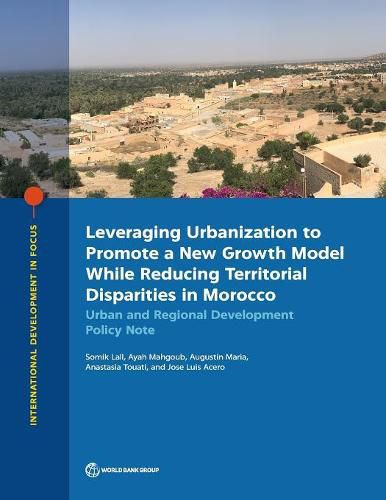Readings Newsletter
Become a Readings Member to make your shopping experience even easier.
Sign in or sign up for free!
You’re not far away from qualifying for FREE standard shipping within Australia
You’ve qualified for FREE standard shipping within Australia
The cart is loading…






Today 60 percent of Moroccans reside in urban areas, as opposed to 35 percent in 1970. By 2050, nearly three-quarters of the country’s population will be living in cities. Along with the concentration of people, urbanization will lead to the increasing concentration of economic activities in cities, which today are estimated to account for about 75 percent of the country’s GDP and 70 percent of investments at the national level. To accompany these transformations, the Moroccan government has adopted, in recent years, ambitious programs to improve living standards in urban and rural areas. Significant improvements in living standards have been achieved through national master plans. Cities are the engines of today’s demographic and economic growth in Morocco, but they also face persistent challenges. Despite substantial public investments and strong potential for cities to absorb rural poverty, important pockets of urban poverty remain. Spatial disparities are a major cause for concern both for citizens as well as for national and local governments. In addition, Moroccan cities are not delivering on their full potential. Urbanization has not generated the same growth benefits in Morocco as it has in many other countries with similar contexts. These patterns suggest that Morocco needs specific policies to improve returns from its urbanization process. The main message of this note is that urbanization and spatial equity are not competing objectives when urbanization is supported and managed well. Well-managed urbanization allows for economies of scale in the provision of services and the development of more efficient labor. This note identifies priority actions to be taken at national, regional, and local levels to allow public authorities to act within a coherent framework and to help urban development to boost economic growth and promote shared prosperity for all.
$9.00 standard shipping within Australia
FREE standard shipping within Australia for orders over $100.00
Express & International shipping calculated at checkout
Today 60 percent of Moroccans reside in urban areas, as opposed to 35 percent in 1970. By 2050, nearly three-quarters of the country’s population will be living in cities. Along with the concentration of people, urbanization will lead to the increasing concentration of economic activities in cities, which today are estimated to account for about 75 percent of the country’s GDP and 70 percent of investments at the national level. To accompany these transformations, the Moroccan government has adopted, in recent years, ambitious programs to improve living standards in urban and rural areas. Significant improvements in living standards have been achieved through national master plans. Cities are the engines of today’s demographic and economic growth in Morocco, but they also face persistent challenges. Despite substantial public investments and strong potential for cities to absorb rural poverty, important pockets of urban poverty remain. Spatial disparities are a major cause for concern both for citizens as well as for national and local governments. In addition, Moroccan cities are not delivering on their full potential. Urbanization has not generated the same growth benefits in Morocco as it has in many other countries with similar contexts. These patterns suggest that Morocco needs specific policies to improve returns from its urbanization process. The main message of this note is that urbanization and spatial equity are not competing objectives when urbanization is supported and managed well. Well-managed urbanization allows for economies of scale in the provision of services and the development of more efficient labor. This note identifies priority actions to be taken at national, regional, and local levels to allow public authorities to act within a coherent framework and to help urban development to boost economic growth and promote shared prosperity for all.